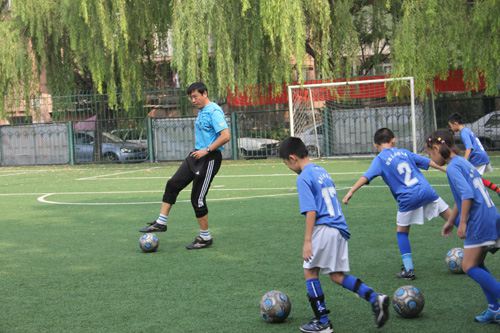|
 |
|
CULTIVATION: Chen Wanyuan, a retired football official, coaches young players from Yinchao Football Club, a training organization for children in Beijing (NI YANSHUO) |
At the 27th Universiade held in Kazan, Russia, from July 6 to 17, the Chinese football team, consisting mainly of student players from the Beijing Institute of Technology, managed draws with both Mexico and Ireland, although they were defeated by Russia, returning without a single win.
"The Beijing Institute of Technology has one of the best football teams of all the universities in China, but it was still unable to win a single match at the Universiade. This really indicates the level of Chinese football," Chen commented.
Positive efforts
China has done a lot of work in recent years to promote football on school campuses. Starting in 2009, the General Administration of Sport earmarked 40 million yuan ($6.54 million) annually from sport lottery funds to promote football on campus nationwide. This year, the figure was increased to 56 million yuan ($9.15 million). Local governments are also required to contribute the same amount.
In 1984, Beijing launched the Baidui Cup football tournament for primary and middle school students, an initiative that Chen said provides a good model to promote football among children and young people.
"Having only this one initiative in Beijing is definitely not enough. We need more," Chen said. "Actually, China has many good models for developing its football, such as the Jianlibao Football Team, but we have failed to go far enough."
In 1992, the CFA and Guangdong Jianlibao Co. Ltd. selected 22 promising football players aged between 13 and 14 years old and sent them to Brazil for seven years of training. This was widely considered an excessively bold measure, but it also built up much hope in the Chinese people that their football dreams could finally come true. However, soon after they returned in 1998, the CFA was unable to make use of the players as they were still contracted to the football clubs they belonged to before going to Brazil. This meant they were not eligible to play for the Jianlibao Football Team, rendering the project a failure.
"The CFA should find ways to continue the Jianlibao model," Chen said, adding that they should pursue and adhere to a long-term plan and stop continually altering what they do.
Though Chen is not satisfied with the work of the CFA, he is delighted to see many football clubs training youngsters, like Yinchao, springing up nationwide.
"These clubs can help get children interested in football and give them the benefit of professional coaching," Chen said. Besides Yinchao, Chen is also employed by several football clubs as a coach.
Talking about his students clearly makes Chen happy. "Many of my former students are working for football administration authorities and the CFA, and many others are very good football players," Chen said. A string of players such as Wang Xiaolong and Zhang Xinxin, all of whom are key players in China's Super League teams, were coached by Chen.
"Most importantly, coaches at youth football clubs should be professional, otherwise children will be misled," Chen added.
In appointing these professional coaches, Chen emphasizes that a good football player is not necessarily a good football coach. "Authorities should examine every coach and grant certificates only to those who are qualified," said Chen, who has gained an A-level certificate, the highest coaching qualification in China.
"Teaching more youth football courses is my dream, and I will pursue it throughout my life," Chen said.
Email us at: yaobin@bjreview.com | 